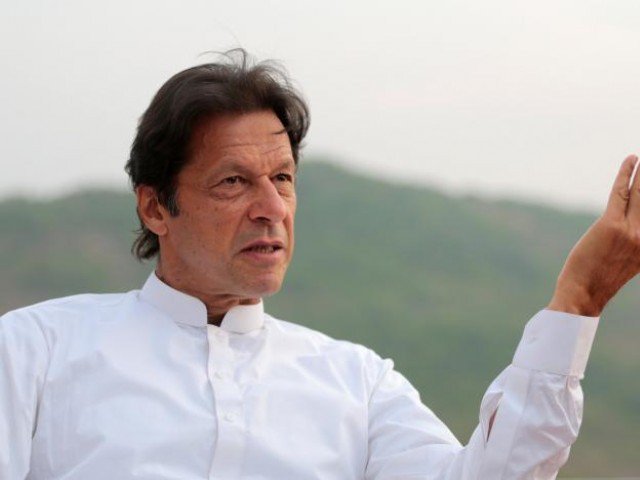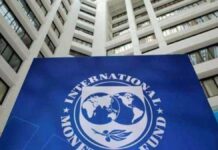
ISLAMABAD: Prime Minister Imran Khan will chair a high-level meeting today to evaluate the conditions put forth by International Monetary Fund (IMF) for a bailout package for Pakistan.
According to well-placed sources, the talks between finance ministry and IMF completed Monday and Prime Minister Imran would be given a detailed briefing over the talks. The meeting is likely to approve or disapprove the IMF conditions for the bailout package to Pakistan.
The meeting is likely to be attended by Finance Minister Asad Umar, former finance minister Shaukat Tareen, Dr Ashfaq Hassan Khan, Jahangir Khan Tareen, Arif Naqvi and others.
The meeting was initially scheduled for Saturday and cancelled due to intervening engagements.
Sources claim that the meeting will evaluate the ‘tough conditions’ put by the IMF negotiating team for Pakistan and prepare proposals to devise a strategy to deal with the arising financial situation.
A source privy to the details of the meeting, however, said that the presence of Arif Naqvi of Abraaj Group in the meeting may raise many eyebrows. It is considered within the PTI circles that Naqvi’s advice remains ‘above-board’ due to his close connections with PTI Chairman Imran Khan, they added.
There are rumours that Arif Naqvi, who was also seen at a meeting chaired by Prime Minister Imran Khan last month, is a financier of Khan’s party. Previously, Naqvi was considered a close friend of Pakistan People’s Party (PPP) President Asif Ali Zardari. He was also considered very close to former military dictator General (r) Pervez Musharraf.
Interestingly, the IMF delegation last week directly reached out to the parliamentarians and sought their support in the implementation of politically unpopular reforms by PTI government, which could throttle economic growth, push inflation and unemployment rates up.
Led by its mission chief Harald Finger, the IMF delegation was scheduled met half a dozen parliamentarians belonging to three mainstream political parties to know their viewpoint on the reforms suggested by the lending agency.
But only two of them, PTI senator Shibli Faraz, who is Leader of the House in Senate, and Pakistan Muslim League-Nawaz (PML-N) Member of National Assembly Dr Ayesha Ghaus Pasha turned up for discussions.
Pakistan People’s Party (PPP) members did not attend the meeting. “The meeting had been arranged by the government without first seeking our consent,” said PPP Senator and Senate Deputy Chairman Saleem Mandviwalla, who had also been invited.
He said the meeting’s time was set in the early morning on Friday without first checking the availability of the members, adding that PPP parliamentarians were keen to meet the IMF delegation.
The IMF requested the parliamentarians to lead the structural reforms which would be implemented under its programme. A meeting participant said the reforms were expected to be highly unpopular. Therefore, the IMF wanted all the political parties to back the programme, which would make it easy to implement them.
The IMF hinted at a further increase in electricity tariffs and total free-float of the exchange rate. The government has already increased electricity tariffs by Rs1.27 per unit and the central bank has let the currency depreciate by 26.6% in the past 11 months.
“Pakistan’s poorest segments should be protected against the impact of the structural reforms,” suggested Dr Ayesha Ghaus Pasha.
However, the IMF’s recipe is aimed at a steep fiscal adjustment that will stifle economic growth and increase inflation due to a proposed massive depreciation of the currency, according to sources in the finance ministry.
They said the implementation of IMF’s policies would lead to a growth rate that would hover around 4% for the next three years.
The IMF team is in the town for the last 10 days to negotiate a bailout package. Talks continued on Saturday as well. Both the sides were having difficulty in agreeing to a new tax collection target for the Federal Board of Revenue (FBR), said the sources.
There is unanimity of views among Pakistani economists that the country needs on an average 7% economic growth to create jobs in order to absorb the youth bulge. Any rate that is below 7% will lead to high unemployment.
“I have told the IMF that Pakistan’s current situation is very peculiar and job creation should not be affected as a result of the Fund programme,” said Pasha. During the meeting, she also emphasised the need for enhancing exports to address the balance of payments challenge on a permanent basis.
Pasha said higher electricity prices would create competitiveness issues for Pakistani exporters, therefore, the IMF should not push for the increase in power tariffs and interest rates.
Senator Faraz raised the issue of the adverse impact of the National Finance Commission (NFC) Award on federal fiscal resources. Pasha differed with Faraz’s assertion, saying the federal fiscal woes were more because of mismanagement and the decision to spend in areas that were now within provincial domains.







IMF as a lender does not care about increase in unemployment, inflation, and what happenes to the pooer and vunerable. The conditions are about ensuring the loan installments are paid in full and on time in the stipulated period. IMF like banks do not lend for phalanthropic reasons, its job is to make money for its chare holders.
Comments are closed.